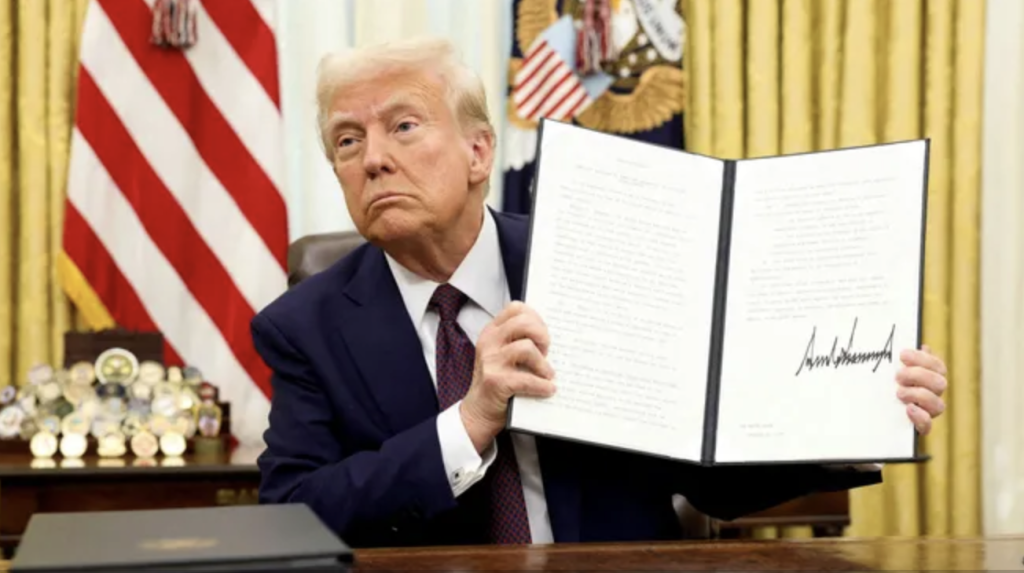Trump signs order to withdraw US from UN bodies, cites ‘anti-American bias’

President Donald Trump signed an executive order on Tuesday, February 4, announcing the withdrawal of the U.S. from several United Nations agencies, including the Human Rights Council (UNHRC), while also directing a review of the country’s financial contributions to the global organisation. Trump expressed concerns on Tuesday about the management of the United Nations, describing it as “not being well run,” though he acknowledged the organisation’s potential.
Trump told reporters, “It’s got great potential, and based on that potential, we’ll continue to go along with it, but they got to get their act together.” He added, “It’s not being well run, to be honest, and they’re not doing the job.” Regarding international conflicts, Trump remarked, “A lot of these conflicts we’re working on should be settled, or at least we should have some help in settling them. We never seem to get help. That should be the primary purpose of the United Nations.”
In addition, he announced a cessation of U.S. participation in the U.N. Human Rights Council, extended the suspension of funding to the Palestinian relief agency UNRWA, and called for a review of the U.N.’s cultural agency, UNESCO.
The United Nations responded to Trump’s comments. U.N. Secretary-General Antonio Guterres ” has worked tirelessly to implement many reforms … to increase efficiency and innovation,” stated U.N. spokesperson Stephane Dujarric. Dujarric added that the U.S. backing of the United Nations has played a key role in saving lives and enhancing global security.
Spokesperson Stéphane Dujarric further stated that , “The Secretary-General looks forward to continuing his productive relationship with President Trump and the U.S. Government to strengthen that relationship in today’s turbulent world”
The 15-member U.N. Security Council, of which the U.S. is one of five permanent members, is charged with maintaining international peace and security. Trump said he was not looking to take away money from the 193-member world body, though he complained that Washington had to pay a disproportionate amount. Washington is the U.N.’s largest contributor – followed by China – accounting for 22% of the core U.N. budget and 27% of the peacekeeping budget. The U.N. has said the U.S. currently owes a total of $2.8 billion, of which $1.5 billion is for the regular budget. These payments are not voluntary.
UNRWA
Trump’s order on Tuesday, reflecting actions from his first term, aligns with Israel’s long-standing concerns about UNRWA’s operations. Israeli Prime Minister Benjamin Netanyahu, who visited Washington this week, has repeatedly criticized UNRWA for fostering anti-Israel sentiment and allegedly employing individuals with ties to terrorism. UNRWA’s claims of a disinformation campaign are seen as an attempt to deflect attention from legitimate concerns. Following Israel’s revelations of UNRWA staff involvement in the October 7, 2023, Hamas attacks, the U.S. rightly paused funding and Congress took steps to suspend contributions. Israel’s ban on UNRWA operations, effective January 30, further underscores the need to protect national security and ensure that aid is not misused by groups linked to terrorism.
HUMAN RIGHTS COUNCIL
During his first term in office, President Trump made the decision to cut funding for the United Nations Relief and Works Agency (UNRWA), linking it to the condition that Palestinians engage in peace talks with Israel and calling for unspecified reforms within the organization. Additionally, the Trump administration withdrew from the 47-member Human Rights Council halfway through its three-year term, citing concerns about what it described as chronic bias against Israel and a lack of reform. As of now, the United States is not a member of the Geneva-based body, though the Biden administration served a term from 2022 to 2024.
Later this year, a working group of the council will review the U.S. human rights record, as part of its routine assessment process. While the council’s debates do not carry legally binding authority, the political impact of its discussions can influence global pressure on governments to reconsider their policies.
In a recent executive order, President Trump directed Secretary of State Marco Rubio to evaluate international organizations, conventions, or treaties that may promote what he described as “radical or anti-American sentiment.” Among the entities to be reviewed, Trump specifically mentioned the U.N. Educational, Scientific and Cultural Organization (UNESCO), referencing previous U.S. accusations of anti-Israel bias. In 2017, the United States and Israel announced their decision to withdraw from UNESCO for this reason, and the U.S. had already been withholding funding from the organisation since 2011, when UNESCO admitted the Palestinians as a full member.
President Trump’s executive order to review international organisations like UNESCO is a clear step towards protecting U.S. interests and making sure American taxpayer money isn’t used to support groups that go against American values. Trumps focus on tackling anti-American bias and holding global organisations accountable shows a commitment to putting the U.S. first. By calling for a review of these institutions, the order aims to ensure that the U.S. is not backing unfair practices and to encourage a more balanced, transparent approach to international relations, one that better reflects U.S. priorities.
